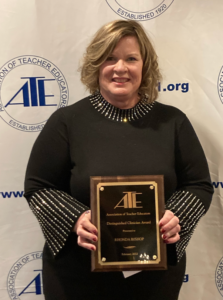Parent work schedules and school schedules do not always match up perfectly. This can leave some families in a sticky situation.
To resolve this struggle, Springfield Public Schools (SPS) joined local organizations to provide quality before and after school care through the SHINE program.
Students pursuing a degree in elementary education at Missouri State University can complete a 30-hour practicum (that is required in the early stages of their degree program) while working at the YMCA.
“Many of our students work to support themselves through school. Their schedules are very tight, so this opportunity is a win-win,” said Rhonda Bishop, clinical instructor in the department of childhood education and family studies.
“It provides the necessary workforce for SHINE, and our students are getting paid while they satisfy a requirement for their class.”
Working in after-school care
Most early practicum experiences involve observing a certified teacher and taking on a few lessons or tasks in the classroom.
In the SHINE program, students are immersed in classroom skills from the start – planning activities, working with students in small groups and managing the after-school schedule.
“Each day, we do a math activity and a literacy activity,” said Sophia Crabtree, an MSU elementary education major and YMCA employee.
“You have to plan ahead, and you learn classroom management skills when you’re working with the kids.”
Having experience working with children is an important part of building your resume as an education major.
“It’s always helpful on your resume if you can show experience working with children,” Bishop said. “I encourage my students to start gaining that experience as soon as possible, and the SHINE program provides that for them.”
Closing the gap
The recent pandemic conditions caused some students to return to school in-person with some additional needs.
“Teachers are realizing that there are some educational gaps for their students,” Bishop said. “So, schools are implementing strategies to lessen that gap. After school care is one of the ways kids can get extra support outside of the typical school day.”
Employees working in the SHINE program can build relationships with students and address needs that may not be met in the classroom that day.
“I can connect with students and give them the attention they need when they have something they want to talk about,” Crabtree said.
“It’s rewarding seeing them progress throughout the year and maybe even handling situations differently because you talked with them about it.”
Explore a degree in elementary education
 Distinguished clinician award
Distinguished clinician award
Bishop was recently awarded the Distinguished Clinician in Teacher Education Award from the Association of Teacher
This award was granted in recognition of her support of students in and out of the classroom.
Bishop’s work to find creative solutions for students to complete their programs, such as the SHINE program, is a valuable part of her contribution as an educator.
Congratulations, Dr. Bishop!

